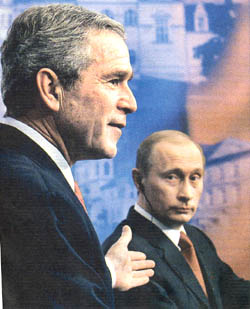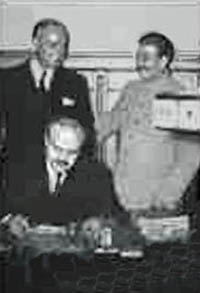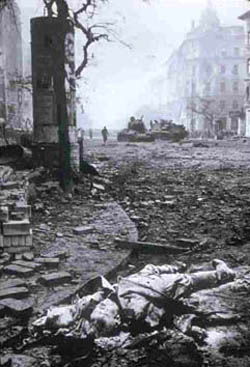 |
International Affairs
Bush Goes to Moscow to Honor Red Army
Toby Westerman
U.S. President George W. Bush will travel to Moscow this May to celebrate the 60th anniversary of the May 9, 1945, Allied victory over Nazi Germany, known as Victory Day in Russia and VE Day (Victory in Europe) in the United States.

"He is my friend." Bush offers this as the main reason for the public to accept the communist Putin - LA Times, February 25, 2005 |
When Bush goes to Russia for Victory Day, he will not only be honoring the heroic actions that defeated Hitler, but will also be praising the Red Army of the Soviet Union, the military tool Moscow used to dominate its neighbors - a tool still in high regard among the Moscow elite.
Bush expressed his enthusiasm about his planned May trip to Russia, defining the purpose of the visit in a recent exclusive interview with Russia's government-controlled news agency, Itar-Tass. "I want to make sure everybody understands I'm coming" in order to "thank you for your sacrifice," Bush declared to Itar-Tass.
Despite concerns over increasing authoritarianism in Russia, Bush has taken pains to characterize his relationship with Russian President Vladimir Putin as close. "He (Putin) is my friend," Bush stated on several occasions, and the Moscow visit is an exercise of that bond.
World War II is known in Russia as the Great Patriotic War, and Putin is using the anniversary of the Soviet Union's victory over Nazi Germany as part of an ongoing campaign to rebuild the prestige of the Russian military.
The Soviet incursion into Afghanistan, the prolonged civil war in Chechnya, severe budget cuts, and revelations of brutality practiced against Russian draftees by enlisted men and officers have all tarnished the reputation of Russia's armed forces.
Putin has gone so far as to describe the "new" Russia as a virtual militarized state where martial values are held in the highest esteem. On February 22, 2005, during Kremlin ceremonies honoring Russian armed forces members, Putin described Russia as a nation of warriors whose fighting spirit is in their blood.
"Russian military traditions are not just passed from one generation to another, but are in the blood of the majority of boys who know from their childhood that they will go to the army when they grow up and become strong and battle hardened warriors," asserted Putin, according to the Voice of Russia World Service, the official broadcasting service of the Russian government.

From left, Hitler's representative Ribbentrop, Molotov & Stalin signing the Nazi-Communist pact of collaboration in 1939 |
While Bush and many in the U.S. may see the "strong and battle-hardened warriors" of Russia assisting in the war on terror, Russian aid to pro-terror states and the joint Russian-Chinese military exercises point in another, more ominous direction.
Moscow is assisting Beijing in preparations for an attack against the democratically governed island of Taiwan, regarded by the communist government in Beijing as a rebel province.
Defeated Nationalist forces fled communist domination of the Chinese mainland in 1949 and established an independently functioning government on the island. U.S. forces have prevented communist forces from attacking the island, and remain the best assurance against attack on Taiwan. Russian assistance to Beijing has greatly hastened China's development of the military muscle needed to challenge the U.S. in the Pacific and quickly overwhelm Taiwan.
When Bush goes to Moscow in May to congratulate the veterans of the Red Army and observe current Russian military prowess, certain historical facts stand in danger of becoming lost - facts which may well have a lesson for America today.
Although Moscow is receiving - and giving to itself - credit for defeating the Nazi war machine, Nazi Germany and the Soviet Union, of which Russia was a part, were allies for nearly the first two years of WWII.

The Red Army massacre in Budapest in 1956, one among many that continues until today. |
Red Army forces invaded Poland shortly after the Nazis launched their assault. After the Red Army victory, NKVD political troops slaughtered thousands of captured Polish officers in the Katyn Forest in Russia.
While Nazi Germany and the Soviet Union were allies, Hitler was free to attack Western Europe. Denmark, Norway, Belgium, Luxembourg, Netherlands, France, Greece, and Yugoslavia all fell under the Nazi boot. Germany began the Blitz against London, and when Churchill and England "stood alone," they stood against both Germany and the USSR.
Soviet leader Josef Stalin trusted Hitler, and did not believe his own intelligence reports of an impending German attack. The Nazi-Soviet alliance continued until June 21, 1941, when German forces plunged into the heart of the Soviet Union. The now-independent nations of Belarus and Ukraine, Soviet Republics at the time, suffered the initial utter devastation of the Nazi onslaught.
The struggle of the Red Army against Hitler was made even more difficult by the systematic destruction of the Soviet Union's officer corps by Soviet dictator Stalin.
The Red Army did prevail, but did not cease its forward march with the fall of Berlin. Soviet troops enforced the rule of pro-Stalin communist governments in Poland, Hungary, Czechoslovakia (now the Czech Republic and the nation of Slovakia), Romania, Bulgaria, and eastern German (reorganized into the German Democratic Republic).
The Red Army made it all possible.

Posted March 2, 2005
Toby Westerman publishes
International News Analysis - Today
An investigative and uncompromising weekly analysis of the world situation
Contact T. Westerman at
www.inatoday.com
or P.O. BOX 5182, Rockford, ILL, 61125-0182
|
International Affairs | Hot Topics | Home | Books | CDs | Search | Contact Us | Donate

© 2002- Tradition in Action, Inc. All Rights
Reserved
|
 |
|